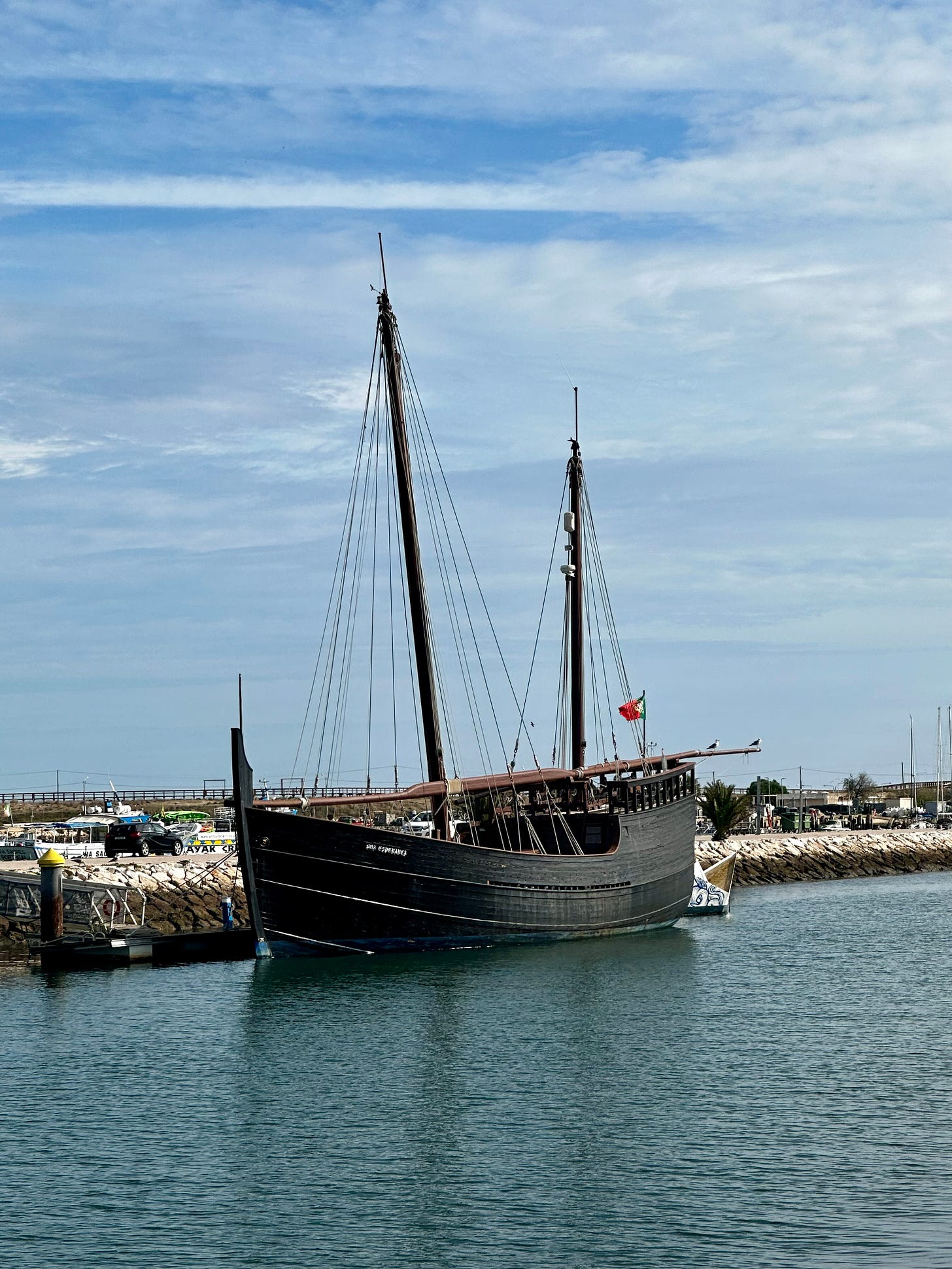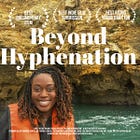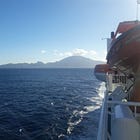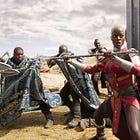Listen🎧: 1619? 1492? 1444? A Search For New Beginnings
Ep. 4 of Beyond Hyphenation: A Deep History of Diasporas
I can’t swim.
This is the first thought I had as I was on a small boat in the Atlantic Ocean a couple of months ago. Yet, I wasn’t anxious. When I need to meditate, I often turn on the sound of ocean waves. With the right kind of headphones, you can feel completely immersed. Peace washes over you.
Two years ago I was immersed, but this time in actual water. I went to the beach on the East Coast of the United States with an old friend. We escaped the heat for a moment by going into the water. Further and further out into the Atlantic Ocean, we went. Suddenly, my feet could no longer feel the security of the sandy bottom of the water. Fear gripped me like instinct. I could see the shore and I could see my friend. So this brought comfort until it didn’t.
I started flailing. I was weightless, yet felt like a stone was tied around my ankle pulling me down. My friend turned to me and said
“Relax"
“I’ll teach you how to float.”
“Lift your legs and align your torso. Don’t panic.” She looked me in the eye with assurance and said “The moment you stop fighting the water, it will carry you.”
Carried me it did. Pre-condensed clouds delicately surrounded me. We both floated.
Until.
Until realization set in. I’m floating in the water. Yes, but not just any kind of water. I’m in the Atlantic Ocean. The sheer size of that fact, put my body into a panic and out of alignment. I began fighting the water. It responded by no longer carrying me. Suddenly, I went under.
My eyes closed. The moment the ocean consumed the crown of my head, all I could hear was my heartbeat.
For 5 seconds, I was in the ocean’s echo chamber— my heartbeat reverberating causing the sound waves to meet the ocean waves.
Heartbeat.
For 4 seconds, I wanted the buoyancy of my low porosity Afro curls to bring back to the surface like a life jacket would.
Heartbeat.
For 3 seconds, I fought with everything in me.
Heartbeat.
For 2 seconds, I relented. I gave in.
Heartbeat.
In 1 second, my mind was transported. Time rewinded. I was in my mother’s womb, dark and enveloped. The amniotic fluid around me was nothing like the ocean. It’s meant to maintain life not take it.
Then my friend’s hand found me and brought me above water.
This is the memory that came to mind as I sat on the boat off the coast of Lagos, Portugal. I couldn’t swim, but I became aware of the orange life jacket that was hugging me. It was snug and I was safe.
The ocean specializes in carrying memories.
The ocean is history. The ocean also has a history. When talking about the ships that transported enslaved Africans across the Atlantic Ocean, Fred Moten and Stefano Harney said this:
“Modernity is sutured in this hold. The hold is the slave ship hold; is the hold of the so-called migrant ship; is the prison; is the womb that produced blackness.”1
When you think of slavery, you may think of 1619. Nikole Hannah-Jones’s phenomenal work The 1619 Project joins a lineage of historians who have traced the origins of America’s founding to the first slave ship to arrive in Virginia in 1619.2
Or maybe 1492 comes to mind.
You might have heard the phrase “In 1492, Christopher Columbus sailed the ocean blue.” This phrase is often taught in American schools to help students remember a myth– “Christopher Columbus discovered the new world.”3 What was the new world? An uninhabited territory? blank slate? Simply, a lie. The world which Christopher Columbus entered was already inhabited by Native Americans.
As I began to dig deeper and deeper into where to begin this history of diasporas, I remembered the work of the Caribbean philosopher and essayist Sylvia Wynter. In 1995, she published the essay “1492: A New World View” and it has one of the most iconic opening lines. She begins
“The dispute over 1492 is in full spate.”4
So many questions here. What’s the debate? Who is fighting? How will the conflict be resolved? Is there a solution?
The “spate” concerns how historians regard the significance of 1492. For some, it marked the subsequent rise of Western power, empires, and hegemony in the region. It was something to be celebrated. For others, 1492 is significant because it marked the beginning of the mass dispersal of African people through the transatlantic slave trade. For Wynter, 1492 marks the culmination of several Portuguese expeditions to find a sea route to West Africa to circumvent the Islamic trans-Saharan monopoly on gold. The Portuguese drew areas of West Africa into a mercantilist trading system of not just gold, but enslaved people. Thus, 1492 marked the beginning of the dispersal to the “New World,” but only after enslaved Africans were being transported across the “Old World.”
I’m familiar with the meaning of 1619. I understand the significance of 1492, but what is this “Old World” slavery Sylvia Wynter is pointing to? What happened before 1492?
According to Arlindo Caldeira, a historian at Universidade Nova de Lisboa,
“Between 1441 and 1444, Portuguese navigators exploring the west coast of Africa captured the first contingents of Africans on the Mauritanian coast and subsequently shipped them to Portugal.”5
In 1441, a Portuguese merchant known as Prince Henry the Navigator transported a small number of enslaved Africans from the coast. The Portuguese referred to these people as azenegues ( people who were Muslims living in the Northern part of Africa). However, what seemed like a small trickle of enslaved Africans soon became a steady stream.
Arlindo Caldeira goes on to say:
“In August of 1444, six caravels, specially outfitted for the purpose of transporting human beings, docked in the city of Lagos in southern Portugal. These ships belonged to a consortium of merchants and seamen and transported 235 enslaved men, women, and children who had been kidnapped in the Bay of Arguin (present-day Mauritania).” 6
What Caldeira points out is that these enslaved Africans were of a much darker complexion than the enslaved Africans who were captured in 1441. The Portuguese were getting closer and closer to West Africa such that by 1492 they had found their footing.
It’s both remarkable and really difficult to read this. On one hand, I am a historian of the British Empire, the modern British Empire at that, so this is a new area of history I am learning in depth right alongside you all. Before 1619, before 1492, there was 1444.
On the other hand, I can’t help but return to the feeling of floating off the coast of Lagos, Portugal just a few months ago. This means the waters upon which our small boat rested carried West Africans like me to the shores of Lagos centuries ago, but why does it feel more recent? I said earlier that time doesn’t really exist underwater, but what if doesn’t exist above water too? Learning this history, it feels like time is experienced in layers. Past and future are all stacked in the present blended by this body of water.
Origins v. Beginnings
Is 1444 the origin point of the African Diaspora? Or is just simply the beginning? I find Edward Said’s meditations on “beginnings” useful in this regard. In his book, Beginnings: Intention and Method, he asks a simple question – “Is the beginning the same as the origin?”7 An origin is an absolute point of reference. It’s static. A beginning, Said argues, is just the first intentional step towards producing something meaningful. It all depends on the story you’re telling.
This is why the question of where you come from can be a tricky question for those living in the diaspora. What is the frame of reference? Do you pick an absolute point of origin or simply a place to begin? Can the origins of the global African diaspora be found in 1619? 1492? 1444?
As you can see I have more questions than answers. I’m still processing all of this information I shared with you today, but a single image flashes across my mind. On our way back to the shores of Lagos, my tour guide pointed out a boat by the docks. It wasn’t like our boat. No, it looked like a boat from the 18th century or maybe the 15th century. Its simple wooden exterior made it hard for me to date, but that boat comes to mind. Knowing what I know now that boat haunts me a bit.
Where did that boat come from? And most importantly what or whom did it carry? and when?
We’ll dig deeper next week!
Until then,
Catch up on past episodes here:
Stefano Harney and Fred Moten The Undercommons: Fugitive Planning and Black Study, 2013, page 93.
I encourage you to read more about this project here: https://1619books.com/
New to whom? Europeans ofc.
It’s interesting here that spate refers to the overflowing of a river due to flooding and also a vigorous procession. The quote is from here: Sylvia Wynter, “A New World View” in Race, Discourse, and The Origin of the Americas: A New World View edited by Vera Lawrence Hyatt and Rex Nettleford (Washington: Smithsonian Institution Press, 1995).
Arlindo Caldeira, The Portuguese Slave Trade, The Oxford Research Encyclopedia of African History.
ibid.
Edward W. Said, Beginnings: Intention and Method (New York: Columbia University Press, 1985), 3.







